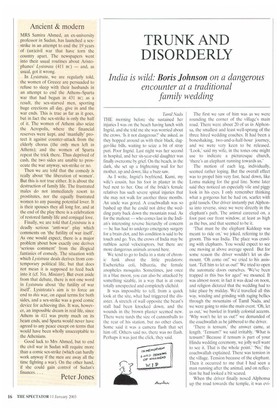Ancient & modern
MRS Samira Ahmed, an ex-university professor in Sudan, has launched a sexstrike in an attempt to end the 19 years of (un)civil war that have torn the country apart. The newspapers went into their usual routines about Aristophanes' Lysistrata (411 BC) — and, as usual, got it wrong.
In Lysistrata, we are regularly told, the women of Greece are persuaded to refuse to sleep with their husbands in an attempt to end the Athens–Sparta war that had begun in 431 Bc; as a result, the sex-starved men, sporting huge erections all day, give in and the war ends. This is true as far as it goes, but in fact the sex-strike is only the half of it. The women of Athens also seize the Acropolis, where the financial reserves were kept, and 'manfully' protect it against counter-attack from the elderly chorus (the only men left in Athens); and the women of Sparta repeat the trick there. Thus deprived of cash, the two sides are unable to prosecute the war anyway, sex-strike or no.
Then we are told that the comedy is really about 'the liberation of women'. But this is not true either. It is about the destruction of family life. The frustrated males do not immediately resort to prostitutes, nor the equally frustrated women to any passing potential lover. It is their spouses they all long for, and at the end of the play there is a celebration of restored family life and conjugal love.
Finally, we are told that Lysistrata is a deadly serious 'anti-war' play which comments on 'the futility of war itself'. As one would expect, there is a major problem about how exactly one derives 'serious comment' from the illogical fantasies of comedy. The situation with which Lysistrata deals derives from contemporary political life, but that does not mean it is supposed to feed back into it (cf. Yes, Minister). But even aside from that debate, there is not one word in Lysistrata about 'the futility of war itself'. Lysistrata's aim is to force an end to this war, on equal terms for both sides, and a sex-strike was a good comic device for achieving this. It was, however, an impossible dream in real life, since Athens in 411 was pretty much on its beam ends, and Sparta would never have agreed to any peace except on terms that would have been wholly unacceptable to the Athenians.
Good luck to Mrs Ahmed, but to end the civil war in Sudan will require more than a comic sex-strike (which can hardly work anyway if the men are away all the time fighting a war). On the other hand, if she could gain control of Sudan's finances. .
Peter Jones


























































 Previous page
Previous page